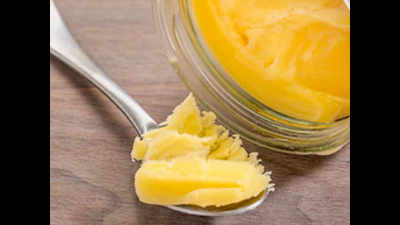- News
- City News
- chennai News
- Tamil Nadu: Ghee, butter as prasad in temples could be ‘inedible’
Trending
This story is from August 17, 2019
Tamil Nadu: Ghee, butter as prasad in temples could be ‘inedible’
The butter given as ‘prasad’ after prayers at temples may contain cancercausing dyes, mustard oil and vanaspati, say food safety officials

Picture used for representational purpose only
CHENNAI: The butter given as ‘prasad’ after prayers at temples may contain cancercausing dyes, mustard oil and vanaspati, say food safety officials.

Worse, some brands of edible ghee risk contamination as they are made on the same production line churning out ‘inedible’ ghee.
Ahead of Krishna Jayanthi, officials on Friday raided more than nine houses in T Nagar that manufacture and sell ‘inedible’ ghee and butter under various names including Vishnu lighting ghee, Sri Krishna deepa ghee, Sri Eshwari ghee and Krishna butter at ₹200 a kg compared to ₹435 per kg of edible ghee by brands such as Aavin.
“The labels clearly mention they are not edible. But we found that people who don’t see the labels eat this butter after it is offered to the god at various temples,” said Chennai food safety officer A Ramakrishnan.
Most manufacturers also make edible ghee and butter on the same assembly line. “This is a complete violation of food safety as there is risk of edible food getting mixed with these chemicals,” another official said. Samples of ghee and butter products were seized from these units and sent for analysis.
“We will be able to find adulterants they use. We can frame charges against the manufacturers if edible ghee is contaminated and if there are labelling issues,” he said. If the charges are proved, it can lead to cancellation of manufacturing licence besides criminal action.
None of the manufacturers reared cows or had dairy farms and bought raw material — white and yellow butter and ghee — from a distributor (name withheld for investigation) in tins. The distributor also gives them 5 litres of a red dye mixed with mustard oil. This goes into ‘white’ butter to give it the colour and texture of cow’s ghee.
The chemicals have also been sent for analysis. Last year, food safety officials in Visakhapatnam found manufacturers mixing synthetic resin adhesive such as Fevicol with ghee.
Consuming ghee or butter mixed with colouring chemicals and vanaspathi is dangerous. While the chemicals can cause digestive disorders and cancer, the effect of vanaspathi is equally devastating.
“It is vegetable ghee that has been hydrogenated and hardened with palmolein. It is high on trans fats, a risk factor for high cholesterol, heart attacks and strokes,” said nutritionist S Bhama.
In 2018, the government said 47 major temples in Tamil Nadu run by the Hindu Religious and Charitable Endowments Department will get Food Safety and Standards Authority of India certification for ‘prasad’. Food safety officials say they check all temples. “We told temple officials and priests not to use inedible substance as offering,” he said.

Worse, some brands of edible ghee risk contamination as they are made on the same production line churning out ‘inedible’ ghee.
Ahead of Krishna Jayanthi, officials on Friday raided more than nine houses in T Nagar that manufacture and sell ‘inedible’ ghee and butter under various names including Vishnu lighting ghee, Sri Krishna deepa ghee, Sri Eshwari ghee and Krishna butter at ₹200 a kg compared to ₹435 per kg of edible ghee by brands such as Aavin.
More than 4,000 tonnes of this ghee and butter is sold to various shops every week besides being supplied to temples, officials estimate.
“The labels clearly mention they are not edible. But we found that people who don’t see the labels eat this butter after it is offered to the god at various temples,” said Chennai food safety officer A Ramakrishnan.
Most manufacturers also make edible ghee and butter on the same assembly line. “This is a complete violation of food safety as there is risk of edible food getting mixed with these chemicals,” another official said. Samples of ghee and butter products were seized from these units and sent for analysis.
“We will be able to find adulterants they use. We can frame charges against the manufacturers if edible ghee is contaminated and if there are labelling issues,” he said. If the charges are proved, it can lead to cancellation of manufacturing licence besides criminal action.
None of the manufacturers reared cows or had dairy farms and bought raw material — white and yellow butter and ghee — from a distributor (name withheld for investigation) in tins. The distributor also gives them 5 litres of a red dye mixed with mustard oil. This goes into ‘white’ butter to give it the colour and texture of cow’s ghee.
The chemicals have also been sent for analysis. Last year, food safety officials in Visakhapatnam found manufacturers mixing synthetic resin adhesive such as Fevicol with ghee.
Consuming ghee or butter mixed with colouring chemicals and vanaspathi is dangerous. While the chemicals can cause digestive disorders and cancer, the effect of vanaspathi is equally devastating.
“It is vegetable ghee that has been hydrogenated and hardened with palmolein. It is high on trans fats, a risk factor for high cholesterol, heart attacks and strokes,” said nutritionist S Bhama.
In 2018, the government said 47 major temples in Tamil Nadu run by the Hindu Religious and Charitable Endowments Department will get Food Safety and Standards Authority of India certification for ‘prasad’. Food safety officials say they check all temples. “We told temple officials and priests not to use inedible substance as offering,” he said.
End of Article
FOLLOW US ON SOCIAL MEDIA










